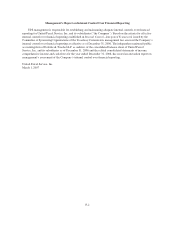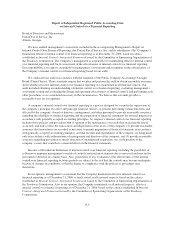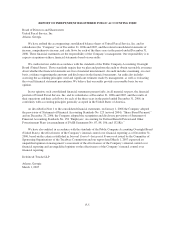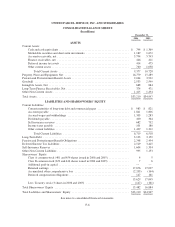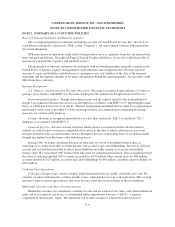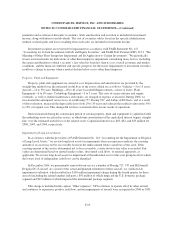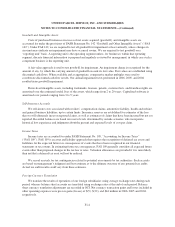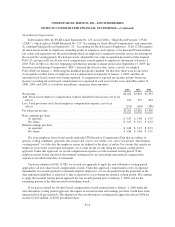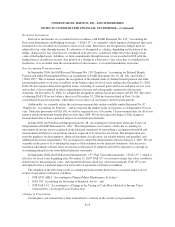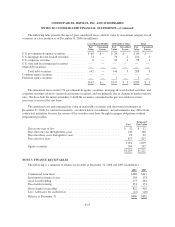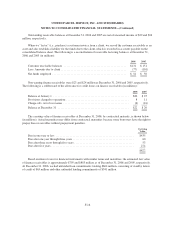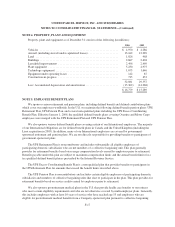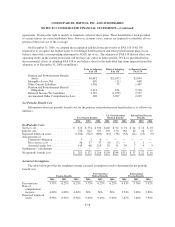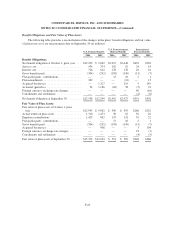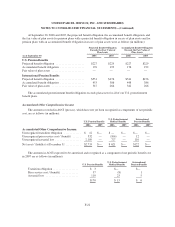UPS 2006 Annual Report Download - page 72
Download and view the complete annual report
Please find page 72 of the 2006 UPS annual report below. You can navigate through the pages in the report by either clicking on the pages listed below, or by using the keyword search tool below to find specific information within the annual report.
UNITED PARCEL SERVICE, INC. AND SUBSIDIARIES
NOTES TO CONSOLIDATED FINANCIAL STATEMENTS—(Continued)
Stock-Based Compensation
In December 2004, the FASB issued Statement No. 123 (revised 2004), “Share-Based Payment” (“FAS
123(R)”), which replaces FASB Statement No. 123 “Accounting for Stock-Based Compensation” and supercedes
Accounting Principles Board Opinion No. 25, “Accounting for Stock Issued to Employees”. FAS 123(R) requires
all share-based awards to employees, including grants of employee stock options, to be measured based on their
fair values and expensed over the period during which an employee is required to provide service in exchange for
the award (the vesting period). We had previously adopted the fair value recognition provisions of the original
FAS 123, prospectively for all new stock compensation awards granted to employees subsequent to January 1,
2003. FAS 123(R) was effective beginning with the first interim or annual period after September 15, 2005; the
Securities and Exchange Commission (“SEC”) deferred the effective date, and as a result, we adopted
FAS 123(R) on January 1, 2006 using the modified prospective method. On that date, there were no unvested
stock options or other forms of employee stock compensation issued prior to January 1, 2003, and thus all
unvested stock-based awards were being expensed. A comparison of reported net income and pro-forma net
income (assuming all stock-based compensation was expensed in each year) for the years ended December 31,
2006, 2005, and 2004, is as follows (in millions, except per share amounts):
2006 2005 2004
Net income ........................................................... $4,202 $3,870 $3,333
Add: Stock-based employee compensation expense included in net income, net of tax
effects ............................................................. 231 157 563
Less: Total pro forma stock-based employee compensation expense, net of tax
effects ............................................................. (231) (165) (588)
Pro forma net income ................................................... $4,202 $3,862 $3,308
Basic earnings per share
As reported ....................................................... $ 3.87 $ 3.48 $ 2.95
Pro forma ........................................................ $ 3.87 $ 3.47 $ 2.93
Diluted earnings per share
As reported ....................................................... $ 3.86 $ 3.47 $ 2.93
Pro forma ........................................................ $ 3.86 $ 3.46 $ 2.91
We issue employee share-based awards under the UPS Incentive Compensation Plan that are subject to
specific vesting conditions; generally, the awards cliff vest or vest ratably over a five year period, “the nominal
vesting period,” or at the date the employee retires (as defined by the plan), if earlier. For awards that specify an
employee vests in the award upon retirement, we account for the awards using the nominal vesting period
approach. Under this approach, we record compensation expense over the nominal vesting period. If the
employee retires before the end of the nominal vesting period, any remaining unrecognized compensation
expense is recorded at the date of retirement.
Upon our adoption of FAS 123(R), we revised our approach to apply the non-substantive vesting period
approach to all new share-based compensation awards. Under this approach, compensation cost is recognized
immediately for awards granted to retirement-eligible employees, or over the period from the grant date to the
date retirement eligibility is achieved, if that is expected to occur during the nominal vesting period. We continue
to apply the nominal vesting period approach for any awards granted prior to January 1, 2006, and for the
remaining portion of the then unvested outstanding awards.
If we had accounted for all share-based compensation awards granted prior to January 1, 2006 under the
non-substantive vesting period approach, the impact to our net income and earnings per share would have been
immaterial for all prior periods. The adoption of the non-substantive vesting period approach reduced 2006 net
income by $23 million, or $0.02 per diluted share.
F-12


